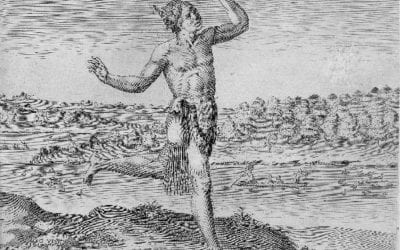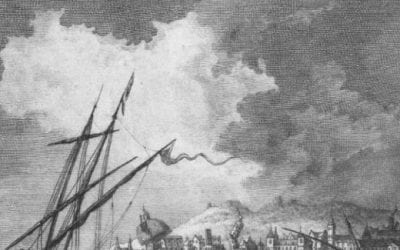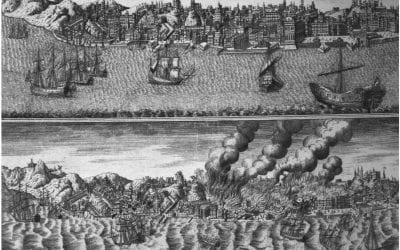A Review of The Rise of Nationalism in Venezuela
Understanding Venezuela: A Case Study on the Nation-State

The Rise of Nationalism in Venezuela By Jonathan Eastwood Gainesville: University Press of Florida, 2006. 212 pages
Nationalism and the idea of the nation-state fascinate us all. We come to think of ourselves, govern ourselves and manage our relationship to the rest of the world through the agency of a nation whose identity we take as our own. Yet when historians, sociologists, or political theorists attempt to define and explain the emergence and function of nationalism, they find it difficult to agree. Jonathan Eastwood’s thorough and fascinating analysis of the construction of the nation-state in Venezuela offers a useful perspective on the larger global phenomenon of nationalism.
Venezuela is an interesting case study because its emergence as a nation takes place within the remarkable transformation of the late 18th and early 19th centuries that within a generation saw the dissolution of the Spanish imperial system and the emergence of almost two dozen recognized nation-states. Venezuela, a Spanish colonial outpost with some recent history of economic prosperity in 1810, a newly engaged participation in the Spanish Bourbon economic and political reforms, and a fragile local political and social structure, offers a particularly interesting place to test various theories, mostly based on European models, about the emergence of nationalism.
Eastwood begins with a useful and comprehensive review of the most significant theories about the emergence of nationalism, emphasizing the challenges of building a theoretical framework. Nation and nationalism exist as general ideas with fuzzy boundaries, and a theoretical construct that appears to explain the emergence of what we might think of as nationalism in one place and time often does not explain the emergence of nationalism in another.
Part of this difficulty stems from the longstanding practice of defining nationalism by taking the circumstances of a particular nation at one point and attempting to explain its nationalistic evolution retrospectively. The problem lies in the assumption that a particular national configuration serves as a stable referent for an analysis of its origins. Often, this is not the case. For example, although we like to imagine the United States as a useful example of national formation, we usually do so with the not altogether persuasive conviction that the Civil War had no other possible outcome than Confederate defeat. We also rarely allow for the possibility that the nation that is today the United States might well have been much different in ideology and identity had manifest destiny not succeeded in capturing all the territory from east to west coasts.
Eastwood’s excellent study of the emergence of a national understanding in Venezuela is particularly good at sorting out how the various participants in the process of creating Venezuela defined, redefined, and in the end established an ideology of national identity. His work offers a view of this process, within a strong theoretical framework that raises the conversation into the larger historical discussion of Western nationalism. In this way, he provides an antidote to the particularistic, “special case” approach to Spanish American nation building that too often informs other work on this subject.
Eastwood concludes his work with this succinct summary:
The idea of the nation [in the Venezuelan case], precisely because of its egalitarian implications, appealed to individuals suffering from pronounced status-inconsistency. The anomie from which late-colonial criollos suffered was resolved by their immersion in a community of first Spanish, then Venezuelan equals. The idea of the nation as a sovereign community of equals was clearly the same idea that had existed in Europe. This is not to say that it was not adapted to local traditions, made use of, and given a local quality when appropriated by Latin American elites, but that in every fundamental respect it remained the same idea. (p.155)
Eastwood’s analysis is persuasive, elegant, and well documented. At the same time, however, those of us of a less theoretical bent will struggle with a perspective that sees the emergence of Venezuela’s self-definition of national identity as primarily an ideological construct. We will wonder whether the effort to find a vocabulary to explain the idea of Venezuela is not more a process of justifying the realigned elite control that emerged from a brutal civil war. Surely, that civil war—fought primarily over who would control what parts of Northern South America, who would control trade and commerce relationships, and who would have sufficient strength to reinvent a functioning mechanism of government—must have some explanatory power.
Gran Colombia was a terrific idea for a nation, as was Bolivar’s view of a united Spanish America. But neither of these ideas had any basis in the practical realities of geography, trade, power, resources, and elite interests. Instead, Venezuela invented itself as a nation as the result of the exercise of power through a series of rebellions and realignments of elites; and as a result of the territory it could claim and control from Caracas. By the late 1840s, the shape of this territory appeared reasonably well established. The elites of that time then proceeded to codify the legends and ideologies that would define Venezuelan national consciousness and assert its exceptionalism, serving as touchstones of national identity to this day.
The creation of Venezuelan nationalism by the mid 19th century might be seen as a justification for the achievements and limitations of the Venezuelan elites who exercised power through the caraqueño bureaucracy. Those elites sustained their power by force of arms when needed, and engaged the dynamic Atlantic markets using the agency of the nation-state. We might argue that the attainment of economic advantage for the Venezuelan elites required the existence of a nation-state capable of behaving more or less as expected by its various trading partners. Thus, Venezuela created a nation that could deal with this outside world and only later worked to construct a believable and effective notion of Venezuelan nationality for its own internal use in maintaining the largest possible national territory.
John V. Lombardi is Professor of History at the University of Massachusetts Amherst and author of Venezuela: The Search for Order, the Dream of Progress (1982), Venezuela en la época de transición (2002), and other items on Venezuelan history.
Related Articles
Environmental Stress and Rainmaking
When Europeans first attempted to settle in North America north of the Rio Grande, their confrontations with Indian cultures were marked by cosmic struggles over environmental…
“Bury the dead and feed the living”
“Bury the dead and feed the living.” These were the words attributed to Portugal’s pragmatic, all-powerful first minister, the Marquês de Pombal, as he contemplated the damage wrought by…
The Jesuit and the Jew
Such a Spectacle of Terror and Amazement, as well as the Desolation to Beholders, as perhaps had not been equalled from the Foundation of the World.” Thus an English merchant writing…




